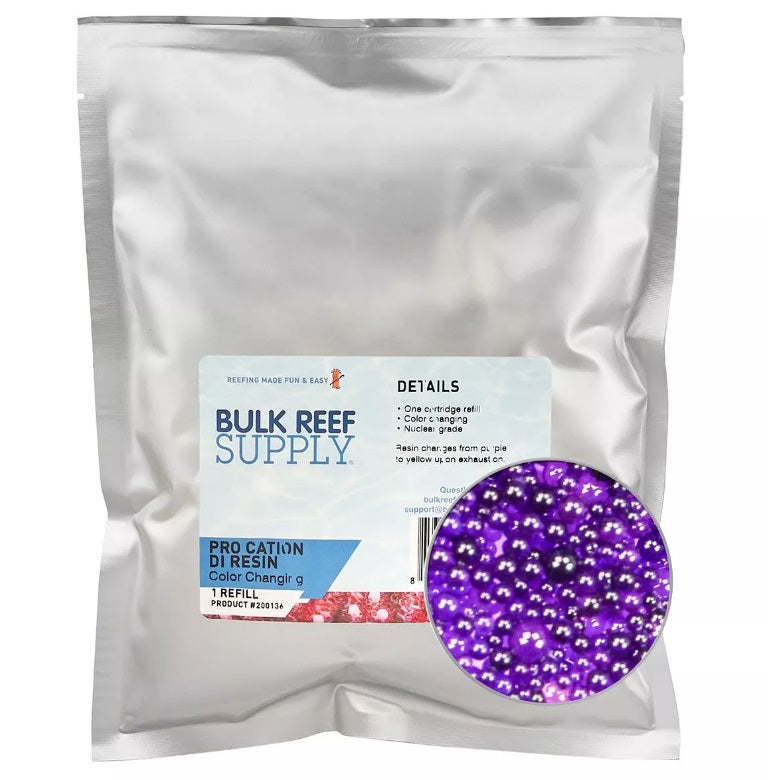BRS PRO Series Cation DI Resin (Color Changing) - Part 1
SKU: 200136
by BRS
$21.99 CAD
One Cartridge Refill (1.25 lbs.) PRO Series Purple Cation Deionization Resin (Color Changing) - Part 1
Changes from Purple to Amber when exhausted
Cation Single Bed Color Changing DI Resin is great for people that want to be more efficient with their deionization resin usage. Single bed resins do require the use of a cation and anion resins followed by a mixed bed resin, but produce much better results, and are much more efficient!
Deionization Resin
Reverse osmosis systems can remove up to 99% of contaminants from your water, however, they can never remove 100% which is the overall goal for reef tank water. That is where deionization (DI) resin comes into play, by taking place as the last "filter" of a RODI system after the membrane. DI resin is ionically charged as either a cation (+) or anion (-) to exchange hydrogen or hydroxide molecules for contaminants like phosphate, silica, nitrate, sulfate, aluminum, iron, calcium, etc allowing you to achieve 0 TDS water for your aquarium and help eliminate any possible water quality issues. You may or may not know that there are multiple types of DI resin available from mixed bed to single bed resins that you can use depending on what the specific goal is for your water and what is in the water after the RO membrane.
Mixed or Single Bed
Single bed DI resins come in many different flavors, but at heart only contain a single cation or anion that makes up the entire media bed. Single bed resins are commonly used in household water softeners and other applications that require either the positive or negative ion to be removed and exchanged for hydrogen or hydroxide ions. The concentration of a single bed lets you focus on specific issues that you may have with your water without wasting extra resin like a mixed bed resins. Mixed bed resins contain both cations and anions in a single bed of media that will remove both positively and negatively charged ions from the water column. Mixed beds are very common in residential RODI system that is used for reef tanks and other types of aquariums since they are easy to use, but when it comes to efficiency and cost savings, single bed systems are the clear winners.
Cation or Anion
Cation = Positive Charge
Anion = Negative Charge
Choosing a single or mixed bed resin can be hard especially if you do not know exactly what is in your water or how a RO membrane will filter it. In most cases, you can use either the cation or anion mixed bed resins but may notice that a TDS meter is showing that the resin is exhausted before the color has changed completely. That is more than likely due to an excess of the opposite type of ion in your water when compared to the color changing dye used in that resin.
Changes from Purple to Amber when exhausted
Cation Single Bed Color Changing DI Resin is great for people that want to be more efficient with their deionization resin usage. Single bed resins do require the use of a cation and anion resins followed by a mixed bed resin, but produce much better results, and are much more efficient!
Deionization Resin
Reverse osmosis systems can remove up to 99% of contaminants from your water, however, they can never remove 100% which is the overall goal for reef tank water. That is where deionization (DI) resin comes into play, by taking place as the last "filter" of a RODI system after the membrane. DI resin is ionically charged as either a cation (+) or anion (-) to exchange hydrogen or hydroxide molecules for contaminants like phosphate, silica, nitrate, sulfate, aluminum, iron, calcium, etc allowing you to achieve 0 TDS water for your aquarium and help eliminate any possible water quality issues. You may or may not know that there are multiple types of DI resin available from mixed bed to single bed resins that you can use depending on what the specific goal is for your water and what is in the water after the RO membrane.
Mixed or Single Bed
Single bed DI resins come in many different flavors, but at heart only contain a single cation or anion that makes up the entire media bed. Single bed resins are commonly used in household water softeners and other applications that require either the positive or negative ion to be removed and exchanged for hydrogen or hydroxide ions. The concentration of a single bed lets you focus on specific issues that you may have with your water without wasting extra resin like a mixed bed resins. Mixed bed resins contain both cations and anions in a single bed of media that will remove both positively and negatively charged ions from the water column. Mixed beds are very common in residential RODI system that is used for reef tanks and other types of aquariums since they are easy to use, but when it comes to efficiency and cost savings, single bed systems are the clear winners.
Cation or Anion
Cation = Positive Charge
Anion = Negative Charge
Choosing a single or mixed bed resin can be hard especially if you do not know exactly what is in your water or how a RO membrane will filter it. In most cases, you can use either the cation or anion mixed bed resins but may notice that a TDS meter is showing that the resin is exhausted before the color has changed completely. That is more than likely due to an excess of the opposite type of ion in your water when compared to the color changing dye used in that resin.


